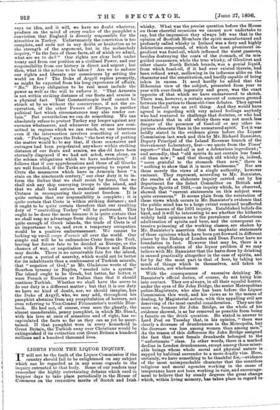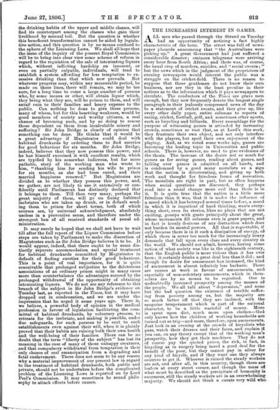LIGHTS FROM THE LIQUOR INQUIRY.
IT will not be the fault of the Liquor Commission if the country should fail to be enlightened on any subject which can be regarded as in any sense cognate to the inquiry entrusted to that body. Some of our readers may remember the highly entertaining debates which used in happier days to take place periodically in the House of Commons on the respective merits of Scotch and Irish whisky. What was the precise question before the House on those cheerful occasions we cannot now undertake to say, but the impression they always left was that in the opinion of Scottish Members the spirit manufactured and profanely called whisky in Ireland was a fiery and highly deleterious compound, of which the most prominent in- gredient was fusel-oil, which inflamed the worst passions, besides destroying the coats of the stomach, of its mis- guided consumers, while the true whisky, of Glenlivet and other classic North British brands, was a genial liquid, from which fusel-oil, if it had ever existed therein, had been refined away, mellowing in its influence alike on the character and the constitution, and hardly capable of being taken in excess. It need hardly be added that the Hibernian view of the subject, presented from year to year with ever-fresh ingenuity and grace, was the exact opposite of that which we have endeavoured to sketch. There was, however, a certain amount of common ground between the parties to those old-time debates. They agreed that fusel-oil was an evil thing. And they would have agreed in regarding with very mixed feelings anybody who had ventured to challenge that doctrine, or who had maintained that in old whisky there was not much less danger of the presence of fusel-oil or any other in- jurious elements than in the unmatured spirit. Yet it was boldly stated in the evidence given before the Liquor Commission last week and this by Mr. Richard Bannister, Deputy Principal of the Inland Revenue branch of the Government Laboratory, first—we quote from the Times' report—" that fusel-oil is not a deleterious ingredient ;" and secondly, that "old spirits do not contain less fusel- oil than new ; " and that though old whisky is, indeed, " more grateful to the stomach than new," there is " nothing to show that it is more wholesome." Nor are these merely the views of a single authority, however eminent. They represent, according to Mr. Bannister, the results of an elaborate inquiry carried out by his department for the Select Committee on British and Foreign Spirits of 1891,—an inquiry which, he observed, showed that " current statements on this subject were quite erroneous." It seems plain from the reiteration of these views which occurs in Mr. Bannister's evidence that the public mind has to a large extent remained unaffected by the lessons of the 1891 inquiry. Established beliefs die hard, and it will be interesting to see whether the hitherto widely held opinions as to the prevalence of deleterious adulteration of spirits and beer, and the consequent ex- tensive poisoning of the working classes, are shaken by Mr. Bannister's assertion that the emphatic statements of those opinions which have been put forward in different places by the Bishop of London and Dean Farrar have no foundation in fact. However that may be, there is a certain simplification of the liquor problem if we may believe with Mr. Bannister that the harm done by drinking is caused practically altogether in the case of spirits, and for by far the most part in that of beer, by taking too much of things which in themselves, and taken in moderation, are wholesome.
With the consequences of excessive drinking Mr.
Bannister's official duties, of course, do not bring him into contact. They are always, in all their squalid horror, under the eyes of Sir John Bridge, the senior Metropolitan police-Magistrate, who also has been before the Liquor Commission this week, and his views as to the means of dealing, by Magisterial action, with this appalling evil are deserving of the most careful consideration. They are the more so, because Sir John Bridge, as the whole of his evidence showed, is as far removed as possible from being a fanatic on the drink question. He stated in answer to Lord Peel on Tuesday that, in his opinion, " there was clearly a decrease of drunkenness in the Metropolis, but the decrease was less among women than among men." As the reason of this difference Sir John Bridge assigned the fact that most female drunkards belonged to the " unfortunate " class. In other words, there is a marked decline in London drunkenness, except among those miser- able beings whose whole moral and physical nature is sapped by habitual surrender to a more deadly vice. Here, certainly, we have something to be thankful for,—evidence of the most unimpeachable character that the countless religious and moral agencies working in the cause of temperance have not been working in vain, and encourage- ment to believe that by steady degrees the great change which, within living memory, has taken place in regard to the drinking habits of the upper and middle classes, will find its counterpart among the classes who gain their livelihood by manual toil. But the question is whether this beneficent transformation cannot be aided by legisla- tive action, and this question is by no means confined to the sphere of the Licensing Laws. We shall all hope that the issue of the inquiry of the present Royal Commission will be to bring into clear view some scheme of reform in regard to the regulation of the sale of intoxicating liquors which, without inflicting hardship on innocent, or even on partially culpable, individuals, will tend to establish a system affording far less temptation to ex- cessive drinking than that which now prevails. But whatever progress may, within any measurable period, be made on those lines, there will remain, we may be too sure, for a long time to come a large number of persons who, by some means or other, will obtain liquor which, they being what they are, will be poison to them, and will entail ruin to their families and heavy expense to the public. Can nothing be done to give these persons, many of whom, but for this besetting weakness, would be good. members of society and worthy citizens, a real chance of becoming such, and by so doing to rescue those dependent on them from incalculable misery and suffering? Sir John Bridge is clearly of opinion that something can be done. He thinks that it would be a great advantage if Magistrates could deal with habitual drunkards by ordering them to find sureties for good behaviour for six months. Sir John Bridge, indeed, believes that they now possess this power, and he has himself exercised it with excellent results, which are typified by his somewhat ludicrous, but far more pathetic, story of the working man who wrote to him, "thanking him for sending his wife to prison for six months, as she had been cured, and their married happiness renewed." But Magistrates are divided as to whether they possess this power, and, we gather, are not likely to use it extensively or con- fidently until Parliament has distinctly declared that it belongs to them. Till then very many, perhaps the great majority of them, will go on fining habitual inebriates who are taken up drunk, or in default send- ing them to prison for short terms, both of which courses are, by universal acknowledgment, absolutely useless in a preventive sense, and therefore under the strongest ban of all received standards of penal ad- ministration.
It may surely be hoped that we shall not have to wait till after the full report of the Liquor Commission before steps are taken by Parliament to make the discretion of Magistrates such as Sir John Bridge believes it to be. It would appear, indeed, that there ought to be some dis- tinctly separate accommodation and special treatment for habitual drunkards committed by Magistrates in default of finding sureties for their good behaviour. This is a point of real importance, for it is quite conceivable that prolonged subjection to the deleterious associations of an ordinary prison might in many cases more than counterbalance the advantages secured by the prolonged withdrawal of the opportunity of obtaining intoxicating liquors. We do not see any reference to this branch of the subject in Sir John Bridge's evidence on Tuesday last, as reported in the Times, but it may have dropped out in condensation, and we are under the impression that he urged it some years ago. There is, we believe, a powerful body of opinion in the medical profession in favour of legislation facilitating the com- mittal of habitual drunkards, by voluntary ptocess, to retreats for the inebriate, and making it possible, under due safeguards, for such persons to be sent to such establishments even against their will, when it is plainly proved that their habits are ruining both their own health and the well-being of their families. There can be no doubt that the term " liberty of the subject" has lost its meaning in the case of many of these unhappy creatures, and that compulsory withdrawal from temptation is their only chance of real emancipation from a degrading and fatal enslavement. There does not seem to be any reason why a material improvement of our present law in regard to the treatment of habitual drunkards, both public and private, should not be undertaken before the complicated problem of the Licensing Laws is reported on by Lord Peel's Commission. It may sometimes be sound philo- sophy to attack effects before causes.

















































 Previous page
Previous page